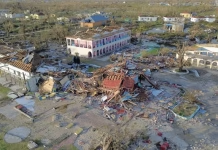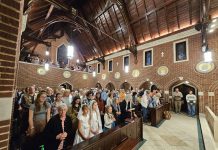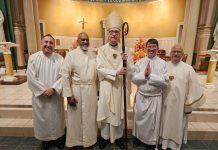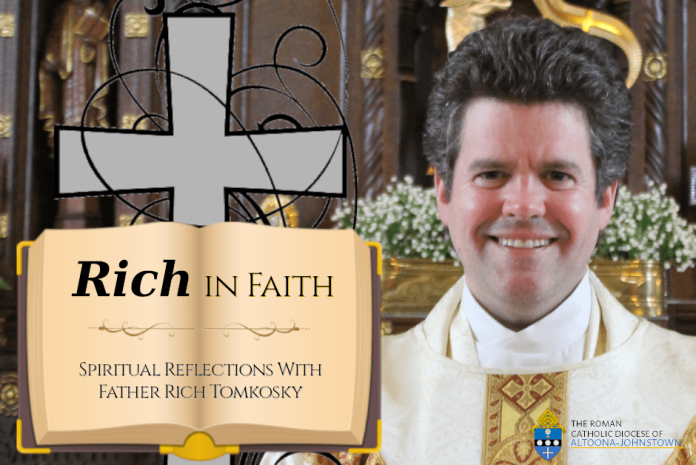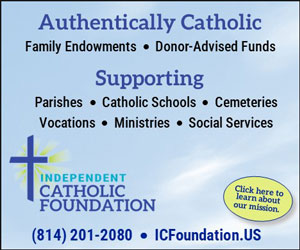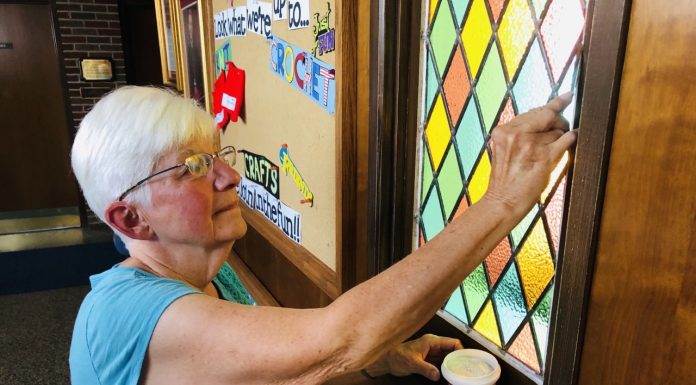By Father Rich Tomkosky
This past weekend, we heard the call of Jesus in the Gospel, and the example of David in the first reading, to love our enemies, to do good to those who hate us, to bless those who curse us, and to pray for those who mistreat us. Why are we called to such a high standard by Jesus in relation to loving our neighbor, especially for those people who are not easy to love? Because He wants us to be “holy as His (and our) Heavenly Father is holy, who is kind to the ungrateful and the wicked,” as Jesus says in the Gospel.
The way of forgiveness and Christian charity is not easy, but it is spiritually liberating. Forgiving others when they hurt us not only is a reflection of God’s holiness, but leads ultimately to healing of our soul, heart, and even our body. We all should know from hard experience that when we hold a grudge or stay angry in our heart/mind towards others, it manifests itself by taking away our inner peace, fraying our nerves, and even leads to ongoing sickness on a physical and mental level. We are called to a higher standard by Jesus if we want to be His disciples here on earth and one day be with Him in Heaven.
Jesus says to be holy, we must do more than simply love the people who love us, which is our natural inclination as human beings. That is not that difficult, at least most of the time. However, the test of our charity is with people we don’t naturally like or who have hurt us deeply (e.g., David in the first reading in relation to Saul).
The call to holiness is NOT an abstraction, but is formed in every day challenges! For instance, how do we love that co-worker who ignores us, or gossips about us, or maybe even stabs us in the back? Do we pray for them? Do we entrust them to God and give our feelings of resentment toward them over to God, or do we obsess upon these hurt feelings, even if only in our mind? How do we deal with the in-law who treats us with disdain for no apparent reason? What about our spouse who maybe refuses to come to Mass and practice the Catholic faith in any real way, who is insensitive to us or who has hurt us in a serious way at some point in our marriage, and maybe still does? Do we offer the sacrifices and sufferings of our daily life for their ultimate conversion, as well as our own, in God? Or do we allow our heart to get cold and put up an emotional wall to “protect” ourselves from getting hurt again, all the while being miserable inside, walking around with chains of sorrow and inner anger that eats away at us and our relationships? Jesus wants to set us free from that dreadful existence.
Jesus doesn’t tell us to do something He Himself didn’t first live out in His life here on earth. His ultimate act of forgiveness to the cruelty of man was on the Cross, when He prayed for His executioners, “Father, forgive them they know not what they do.” This is the model response for us humans of how we are to treat those who hurt, misunderstand, and even persecute and do evil toward us.
We now have the grace in Christ to forgive and love just as He did, to love, to do good, bless, and pray for everyone. We must be merciful as our Heavenly Father is merciful, if we desire to receive His mercy and forgiveness for our manifold sins over the course of our lifetime, and especially at the hour of our death.
As we pray in the Our Father, “And forgive us our trespasses as we forgive those who trespass against us,” do we believe and try to live that petition or are they just words we say repeatedly, without thinking? How can we not forgive others, when God has forgiven us numerous times in the Sacrament of Confession, of even grave sins? But have we regularly sought His forgiveness in that beautiful Sacrament and taught our children and grandchildren to do the same? Or do we out of pride and/or shame refuse to go to that Sacrament?
Also, remember that loving our neighbor doesn’t necessarily mean we have great feelings toward them, especially if they have hurt us badly and haven’t apologized and changed their insensitive/mean behavior toward us, but we still need to pray for both the healing of those hurts in our heart and mind, and to will in generosity to pray for their true spiritual good that God convert them and us in His holiness in a more profound way.
Remember as Jesus says, “For the measure with which you measure will in return be measured out to you.” Take to heart that truth, for truly our and others’ eternal salvation is at stake! May God bless us all with a truly magnanimous and forgiving spirit. God bless you.
Father Rich Tomkosky is the Pastor of Saint Thomas the Apostle Parish in Bedford and the Pastor of Seven Dolors of the Blessed Virgin Mary Parish in Beans Cove.



